#complementarian view
Explore tagged Tumblr posts
Text
Really sick of all the suggestions re the recent transmisogynistic policy against Sarah McBride to bring in “buff trans men to use the women’s restroom to make the cis women there/cis men outside feel uncomfortable and see that actual scary masculine men don’t belong in women’s restrooms so they’ll understand why the AGAB-restricted policy needs to be reversed” or for her to use the men’s restroom as a protest and ostentatiously “acting ‘femininely’/‘like a woman’” (e.g. putting on makeup or doing her hair) “to make the Republican cis men in there uncomfortable because she’s ‘very visibly presenting as a woman’ so they’ll admit she doesn’t belong in the men’s restroom and will be so uncomfortable they’ll want to reverse the policies and let her use the women’s restroom.”
Like, how do you not realize this still relies on a cissexist/transphobic/binarist/complementarian/oppositional view of gender, still portrays trans people as genuinely threatening or uncomfortable to cis people in restrooms, implicitly misgenders/denies the equal rights of trans people who don’t “pass” well enough and are less “respectable”/“presentable,” reaffirms the notion that gender non-conformity or the proximity of “the opposite gender”/associated social rituals in gendered spaces is necessarily cringe-inducing/disgusting/repulsive/undesirable, reaffirms the validity of judging people’s right to use the restroom they want to use based on their gendered characteristics instead of just affirming their autonomy, validates cis (gender-conforming) people as the rightful judges of who is/isn’t allowed / as the ones who ultimately deserve to be specially accommodated/who set the standard, erases femme men and butch women (cis or trans) as well as trans people who may want to choose to use the restroom aligning with their AGAB despite appearing visibly nonconforming already for whatever reason (including safety or convenience in some respects), and places obligation on and trivializes the danger of trans people putting their bodies on the line in protest (in an undignified and almost exploitative/objectifying way) when we all know full well that Republican cis men and women already don’t actually want trans women or trans men in the same restrooms with them, respectively? We already know they would react with hatred against trans people who use the “right” restroom too. This has played out elsewhere in real life plenty of times before, where trans people trying to comply with such regulations have been questioned, policed, harassed, and kicked out by security anyway.
(And nonbinary people are always forgotten and left out of the conversation completely because of course.)
572 notes
·
View notes
Text
Something something I love Side Y Christians but cannot stand their theology because it is built off of (1) Reformed theological views on nature, sin, total depravity, concupiscence, imputed righteousness, etc and (2) Complementarianism.
And I despise them both.
#meanwhile side b is based off of roman catholic views of nature and sin and sex and marriage#and side a is complicated and i'm still figuring it out#it similarly relies on roman catholic views of nature and sin though
13 notes
·
View notes
Note
How do you read Adam and Eve story as not gender complementary crap?
by recognizing it as a story written with a very different gender construction than we have today.... in much of the ancient world, "man" and "woman" werent distinct, self-identifiable, complete complementary ways of being. there was one way of being: to be a man. a woman was simply something that failed to be a man. this was aristotle's view.
in the first creation account, the mention of "male and female" is in the context of fertility. one of the modes of signification woman-ness is used with in the bible is that of childbearer. this is not the only thing it means in that tradition, it is not a definition, but it is a symbol.
god "created humans in his image, in his own likeness he created them, male and female he created them..." he then gives them the blessing to "be fruitful and multiply and fill the earth."
the focus of this whole creation story is god as the source of earth's fecundity, of life--seed-bearing plants and trees, animals that crawl on the earth, and humans--everything that procreates in imitation of god who creates. god takes on the role of all the gods of the ancient mythologies--he is not simply an orderer, he is a childbearer, he is fecund. and so "male and female" (procreator and childbearer) are equally in his image, in his likeness. this is why gender essentialists and complentarians love this image--it fits easily into their narrative.
but it's not hard to look elsewhere in the bible for other modes of signification (or in later theological tradition--jesus, the Word, proceeds ex utero patris--from the Womb of the father--a father, a masculine image, can represent childbearing too). we just need to look to the second creation story.
the essentialist complentarian wants to say man and woman are made for each other because they are different and ontologically so. but that is not what we find in this story. when God makes Eve from Adam's side and he wakes up, he says "here at last is bone of my bone and flesh of my flesh..." it is her likeness to him that makes them partners, not her difference.
the difference is the way they are made distinct from each other, made intelligible despite their fundamental likeness. this is a common instinct in ancient myth--the symposium recounts a Greek version where likewise the yearning for another is symbolic of some primal oneness we want to restore.
indeed, that adam, "man", is only gendered after the creation of eve fits well with contemporary views of gender (like those presented by judith butler) that see it as a mode of intelligibility. we create genders, not to represent some ontological difference, but to express ourselves as part of a community--without these signifiers, we could lose identity, become caught up in oneness.
this reading of genesis, where adam and eve becoming gendered people only after meeting each other represents the fact that gender is not something ontological, intrinsic in being human, but rather a way to distinguish between people who would be unintelligibly alike has the same relation to the original story as the complementarian or essentialist interpretation--it's reading in a modern hermeneutic that's alien to the text itself. as i said in the last ask, the text asks for this in a way.
but fundamentally, what can we take from god's making of man and woman in the two genesis creation myths? that both are ways of being that imitate god, that they have multiple symbolic meanings, that they are ways of interpreting the world that afford multiple dimensions. genesis is not saying that, but it demonstrates it. and that can, i think, help some people (it has helped me) navigate how they connect to the complicated and thorny ways we build our identities, including but certainly not limited to gender.
and then id just encourage you reading of the stories, or rereading, if you're familiar with them... theyre short, they speak for themselves, i think they're fairly enjoyable. not as a religious exercise (which i do!), just as an encounter with great human literature from a distant past that still speaks despite the many changes in modes of thought that stand between it and us.
the second (but older) creation story, with the creation of humans from dirt and the expulsion from the garden, is genesis 2:4-3:25. the first (and more formulaic and abstract) is genesis 1-2:3. i think theyre best approached as separate short stories before being explored in the context of each other.
7 notes
·
View notes
Note
Hi, hey, hello! For the fic writing game: 🎶 & 📚 , pretty please? 😘💛
Thanks for the asks! 🍻💛
🎶 do you write with music? does the music you’re listening to influence your writing?
Music shows up in quite a few of my stories from obscure facts about Scriabin to complicated running themes that ladder up to my preoccupation with non-complementarian dialectical egalitarianism in intimate relationships. (Yes, I am a dork, but I'm a dork who's having a lot of fun.)
With longer stories, I will sometimes have a song that has a touchstone ✨vibe✨ that I'll listen to when I'm trying to get into the right headspace for writing, especially when I'm tired. But I don't listen to music while I'm writing (...except for when I was writing during my subway commute in the pre-pandemic world and then I'd listen to very familiar classical music as a better alternative to how loud old subways can be).
So music both influences and inspires my writing, but for that reason I use it sparingly in the process.
-
📚 do you ever read similar works while writing, or do you intentionally not read them?
I don't read much when I'm really in the throes of a writing project and what I do read tends to be wildly different from what I'm working on. The more I write in a fandom, the less I'm able to read in that fandom in general, which is a sucky downside I've learned to live with.
When I was younger, I'd look back at certain passages in other works that achieved something similar to what I was going for and try to puzzle out how the effect was technically produced. For example, if you want the color in a scene to strike the reader particularly vividly is it better to use simple color words (blue) or more narrowly precise color words (turquoise)—what's the difference in effect and when should you use one vs the other—is the sort of question that's fascinated me for a long time. And I still run into passages that leave me stunned and stuck on as I try to spot the sleight of hand hidden in plain view within the magic trick of making words feel so vivid and real, folding up whole little worlds inside them.
Ask me a writing question :)
5 notes
·
View notes
Text
2023 In Books!
Due to mild fatigue, 2023 was a bad reading year for me - I did not reach my yearly 2-books-a-week goal for the first time since I began logging them, and many of the books I did read did not agree with me. But I still found ten fiction and 7 (!) non-fiction books I had to shout out for the end of the year.
Top 10 Fiction THE RED PALACE by June Hur A historical murder mystery set in Joseon Korea, featuring crystalline prose, a painstakingly evoked historical setting, and an understated romance in a dark atmosphere of terror, secrets, and palace intrigue. Despite being written for a young adult audience, this book impressed me with its complex picture of a deeply flawed real historical context.
TOOTH AND CLAW by Jo Walton A Victorian style comedy of manners in which every single character is a dragon, from the dragon parsons and spirited young lady dragons to the crotchety old dragon dowagers and feckless young dragons-about-town. All of them wear little hats. Sheer cosy perfection.
DRAKE HALL by Christina Baehr My bestie surprised me this year by spontaneously producing four whole novels pitched as "cosy Victorian gothic, with dragons". I haven't read the final edition of DRAKE HALL yet but it's sunshiney, summery, cosy goodness. With dragons.
CRIMSON BOUND by Rosamund Hodge (re-read) A dark and bloody fantasy full of lifegiving female friendship, ride or die siblings, theology, guilt, and stabbings. This one also contains gratuitous St Augustine quotes, a one-page retelling of the VOLUNDARKVIDA, and a love triangle that exists to present the heroine not so much with drama as a proper ethical dilemma.
EMILY WILDE'S ENCYCLOPAEDIA OF FAERIES by Heather Fawcett The story of a mildly autistic lady academic researching faeries with her flamboyant rival professor, who is probably secretly an exiled fae king…but the annoying part is his habit of making his students do all his field work. Cosy, thrilling, hilarious.
THE LAST TALE OF THE FLOWER BRIDE by Roshani Chokshi This gothic-infused psychological thriller was dark, creepy, and sometimes heavy, but it's also a tale that flips the roles of innocent maiden and Bluebeard, engages in valid Susan Pevensie Discourse, and ends on what I found to be a genuine note of hope and healing.
THE COLDEST GIRL IN COLDTOWN by Holly Black This book tackles vampirism as a metaphor for the evil hidden in the human heart, and it's epic, bloody, twisty, and monstrous. I couldn't put it down. Not sure I'd recommend it for the target audience, but it's mature and well-crafted enough to be enjoyed by grown-ups as well.
THE WITCHWOOD KNOT by Olivia Atwater I've read a number of Olivia Atwater books, and this one is head and shoulders above the rest. The best blend of gothic and fae, like a grown-up LABYRINTH, with one of the great fae butlers and so many subtle yet walloping feels. It felt like an old fairytale in the best possible way.
BEHIND THE CURTAIN by WR Gingell The WORLDS BEHIND series is about trauma and healing and repentance, and in this, the fourth book, everything comes decisively to the boil as our favourite twisty knife uncle pits his wits against an enemy who very uncomfortably mirrors himself.
Top 7 Non-Fiction (because I couldn't get it down to just five)
TWO VIEWS ON WOMEN IN MINISTRY by Beck & Gundry (eds.) Four New Testament scholars from a range of complementarian and egalitarian perspectives debate the question of women in ministry, with a lot of detailed scholarship. If nothing else, this book proved that this is something orthodox Christians can honestly disagree about, because there are significant exegetical strengths and difficulties with each position - it's time to stop seeing women holding ministry positions in the church as tantamount to heresy.
REFLECTIONS: ON THE MAGIC OF WRITING by Dianna Wynne Jones This collection was magical - funny and sad tales of her life, many good and passionate thoughts on books and writing, and one absolutely marvellous study of narrative structure in THE LORD OF THE RINGS. Absolutely delightful and highly recommended.
PATERNAL TYRANNY by Arcangela Tarabotti A 17th-century nun takes aim at the misogyny of early modern Europe, wielding razor-sharp logic to argue boldly for the equality of women. But it's Tarabotti's passionate faith, which somehow managed to survive moral injury and spiritual abuse, and even came to see hope and encouragement in scriptures which must so often have been used against her, that will stay with me.
THE GOLDEN RHINOCEROS: HISTORIES OF THE AFRICAN MIDDLE AGES by Francois-Xavier Fauvelle A series of bite-sized essays on the medieval history of Africa from approximately the Islamic conquests of the 7th century to the arrival of Portugese colonists in the fifteenth. Each essay offers the most fleeting glimpse of a long-vanished, half-imaginary world of often breathtaking sophistication and splendour. I loved them.
ONE HOLY LOCAL CHURCH? by Bojidar Marinov This short book, which draws very solidly on past luminaries like Rutherford, Gillespie, Spurgeon, and Hodge, helped me think through some of the questions I've been asking myself about ecclesiology and the role and authority of elders, particularly as I've been rethinking women in ministry. Terrific.
TEN DAYS IN A MAD-HOUSE by Nellie Bly "People on charity should not expect anything and should not complain." In 1887, the American "girl reporter" Nellie Bly got herself locked up in a New York lunatic asylum, and this shocking expose was the result. Sometimes, nineteenth century attitudes towards women and the poor were beyond parody.
A PEOPLE'S TRAGEDY: THE RUSSIAN REVOLUTION, 1891-1924 by Orlando Figes Some aspects of this book have aged poorly - the unthinking acceptance of Russian imperial aspirations, for instance - but apart from that, this is a sweeping, epic picture of the Russian Revolution, covering three decades and every level of society, from daily life in the village commune to the political rivalries of Lenin's declining years, without ever becoming dull or bogged down in detail.
14 notes
·
View notes
Text
gender around the world
thinking of making an effortpost elaborating on my 'gender is about power' post. a lot of people don't know just how common gender roles are across the world. like, every society that we know of has gender-segregated labor. they're not all equally strict, but this division is one of the few human universals we know of. and another one is that in every society we know of, women are responsible for childcare.
not all societies denigrate women. the extreme denigration of women is basically societies that imprison women at home, because to appear in public is to be 'indecent' and therefore mark you as a bad woman worthy of punishment and violence. these are called ideologies of female seclusion. examples include, to varying extent, ancient athens, modern iran, ancient china, the modern christian fundamentalist movement. these societies also tend to culturally devalue women's contributions to society. lip service will be given to the importance of mothers, but the most important and recognized people in society will be men. any influence women have tends to be behind the scenes influence on particular powerful men. this type of seclusion is somewhat more common in europe and asia.
some societies culturally recognize women's value and allow women to become high-status individuals publically. women appear in public, have spheres of power they control, and are not systematically degraded (but a caveat, which i explain soon). these societies include the ancient oyo benin of western africa (modern day descendants are the yoruba), the iroquois, the inuit, the !kung people. this type of cultural recognition is somewhat more common in africa and the (indigenous) americans.
now for the caveat - even societies that viewed women as valuable, important, powerful, often have anti-women organizing principles. arranged marriage exists among the inuit and !kung people, for instance, with an older man betrothed to a girl or young woman. there are multiple yoruba proverbs that denigrate or patronize women. these societies are not feminist utopias. they are societies that believe in the complementarian value of women's work, recognize it, and where women are expected to be full members of society. this does not mean that men and women are utterly equal in dignity.
there are many manifestations of the arrangements above - the lamalerans of indonesia don't have a culture of seclusion but do value men's labor over women's. even among fundamentalist christians, we see different levels of female seclusion and leadership among the different subgroups. i note trends, and trends are not absolute.
why does this matter to us? because it proves that gender is not a liberatory principle. gender is not even primarily an aesthetic principle. gender is a script handed to people that they must play so society can function. some scripts say that women's roles are important and valuable and ought to be celebrated. other scripts say that women's roles are less important and women are shameful and should stay secluded. but it is worth noting they are scripts nonetheless.
understanding that gender exists to organize labor, values, reproduction, also means you understand why feminists should study economics. male anxiety about female empowerment rises when male employment is threatened. in other words, rising unemployment for men = increasing anxiety about women "replacing" them = increasing desire for strict gender roles that "assure" men places in society. (btw - many women also feel the same in societies where they depend on men, and employed women are viewed as enemies.)
until we figure out how to get men to stop being existentially concerned with their place on the masculine hierarchy, decreases in male employment and male success will continue to be boons to anti-feminist. and so, in addition to being worried about unemployment because of how it affects women's labor directly, feminists should be worried about unemployment because it ferments anti-female resentment. (could managing unemployment levels thus turn out to be a way to control anti-feminist sentiment, so that feminists can lay groundwork for more advanced feminist points? instead of always worrying about maintaining the gains we have? food for thought)
#radical feminism#global feminism#mypost#feminist economics#anthropology and feminism#origins of patriarchy
13 notes
·
View notes
Text
Women Disciples, Introduction to the Series
I was not thinking about egalitarianism when I began to read the Gospel of John in Greek. But what I discovered has blown my mind. #Egalitarian #Complementarian #Patriarchy #Mutuality
I have been sitting on this for a while, thinking about it for a long time. The debate continues as to whether Scripture endorses, or at least permits, or rather forbids women from certain roles within the Body of Christ. May women be deacons? May women be elders? May women be pastors? May women be bishops? May women teach or lead in church? At stake, of course, is how to live rightly before…
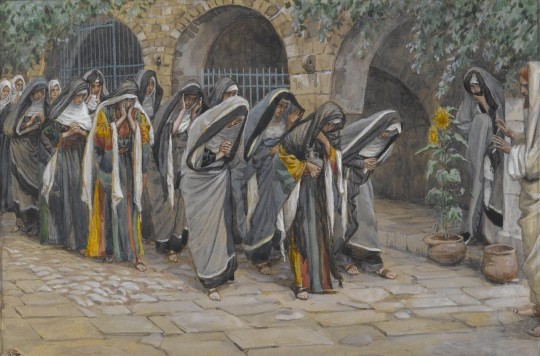
View On WordPress
#complementarian#complementarianism#Egalitarian#egalitarianism#Gospel of John#mutualism#mutuality#patriarchy#women disciples
1 note
·
View note
Note
It’s funny about that, Republicans reading Paglia, because you could probably pull a strong essentialist (maybe even feminist) complementarian conservatism out of her: something like “women are compensated for patriarchy by access to chthonian natural flux from which men are excluded and which civilization falsely denies: therefore be content with your lot, knowing that you have what they may never possess” but as you point out, there’s too much gay stuff (not to mention the pedophile apologia) and I can’t imagine a stern Christian patriarch looking too fondly on her seeming notion of men as unsettled and almost defective, aggressive and yearning hopelessly for a feminine peace and wholeness (even if she does think it’s where our western greatness comes from!) forever denied to them by biology.
Yes, well said, plus her view of both art and religion resting on a foundation of sexual perversion, from voyeurism to sadism to autoeroticism. She's genuinely beyond right and left.
3 notes
·
View notes
Note
What type of Christian are you?
I've got this in my pinned post, I think, but I'll answer it anyway.
I am an Evangelical Arminian complementarian evolutionary creationist (of the British variety; we're a lot less political and legalistic than the American ones) who accepts many Catholic and/or Orthodox views*. Specifically: Church Tradition is important to properly understanding the Bible (want to understand the Bible? Look at how it was viewed by wise Christians through the ages), the Apocrypha are canonical and inspired (and, hence, prayer for the dead is, as the Catholics put it, permissible and profitable), salvation requires a degree of works (it's not as though God is going to cross your name out of the Book of Life because you haven't reached your annual prayer quota or anything like that, but to retain the spiritual life that grace gave you you need to commit to it with work) and asking the saints for prayers is permissible and profitable. I did consider leaving Evangelicalism (which I grew up in) for Catholicism, but ultimately decided to stay in because my disagreements with Evangelicalism and agreements with Catholicism were insufficient to make a wholesale changeover.
Hope that makes sense!
*Any Orthodox Christians reading this, sorry for lumping you in with Catholics. You're probably tired of being either ignored or lumped in with Catholics, but I'm doing it because A) I was converted to a lot of these views by Orthodox blogger Joel Edmund Anderson but mainly considered them in light of Catholicism and B) while there are important distinctions, the two are a lot more similar to each other than either is to Protestantism.
4 notes
·
View notes
Text
Dr. WG, PhD., Harvard Graduate; Miriam (Reference Only): We should surely be thankful for the prophetic ministries of Miriam (Exodus 15) and Huldah (2 Kings 22:14–20; 2 Chronicles 34:22–28), but they occur in contexts that clearly affirm male leadership over God’s people, and they are not passages that discuss governing or teaching roles in the New Testament church. [Note: In the church, Ahab /Jezebel are egalitarians/ evangelical feminists/masculine females/effeminate men. Jesus is a complementarian [patriarchal].]
We should surely be thankful for the prophetic ministries of Miriam (Exodus 15) and Huldah (2 Kings 22:14–20; 2 Chronicles 34:22–28), but they occur in contexts that clearly affirm male leadership over God’s people, and they are not passages that discuss governing or teaching roles in the New Testament church. In spite of numerous setbacks in academic research on the meaning of Scripture,…

View On WordPress
0 notes
Text
Dr. WG, PhD., Harvard Graduate; Miriam (Reference Only): We should surely be thankful for the prophetic ministries of Miriam (Exodus 15) and Huldah (2 Kings 22:14–20; 2 Chronicles 34:22–28), but they occur in contexts that clearly affirm male leadership over God’s people, and they are not passages that discuss governing or teaching roles in the New Testament church. [Note: In the church, Ahab /Jezebel are egalitarians/ evangelical feminists/masculine females/effeminate men. Jesus is a complementarian [patriarchal].]
We should surely be thankful for the prophetic ministries of Miriam (Exodus 15) and Huldah (2 Kings 22:14–20; 2 Chronicles 34:22–28), but they occur in contexts that clearly affirm male leadership over God’s people, and they are not passages that discuss governing or teaching roles in the New Testament church. In spite of numerous setbacks in academic research on the meaning of Scripture,…

View On WordPress
0 notes
Text
This is a totally normal first date conversation for Christians. Especially if they’re Evangelical or Baptist flavored. We’re indoctrinated from a young age that the only purpose of dating is to determine marriage compatibility and to either marry or break up with someone as fast as possible. I was told all through adolescents that dating for several months and breaking up was “rehearsing for divorce” and that I shouldn’t even go on a date with someone unless I thought marriage was a high probability. Basically turning saying into an engagement speed run.
So you jump straight in with your theological deal breakers, everyone has their own strategy. For me it was whether the 7 day creation narrative has to be interpreted as literal 24 hour days. I use that question to determine someone’s view on how we interpret the Bible in general so I knew his answer to that would answer several of my other theological questions. Like, how do science and the Bible interact, how literally do you interpret scripture, do you understand that some parts are literal and some aren’t, are you open to changing your view as you gain information?
Once he passed that test I asked him if he was Complementarian or egalitarian and he said “depends on how my wife feels about it.” So I kept him.
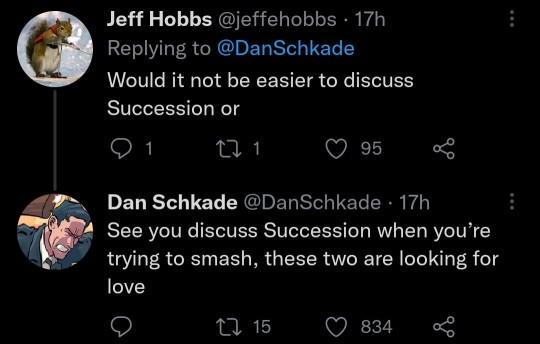
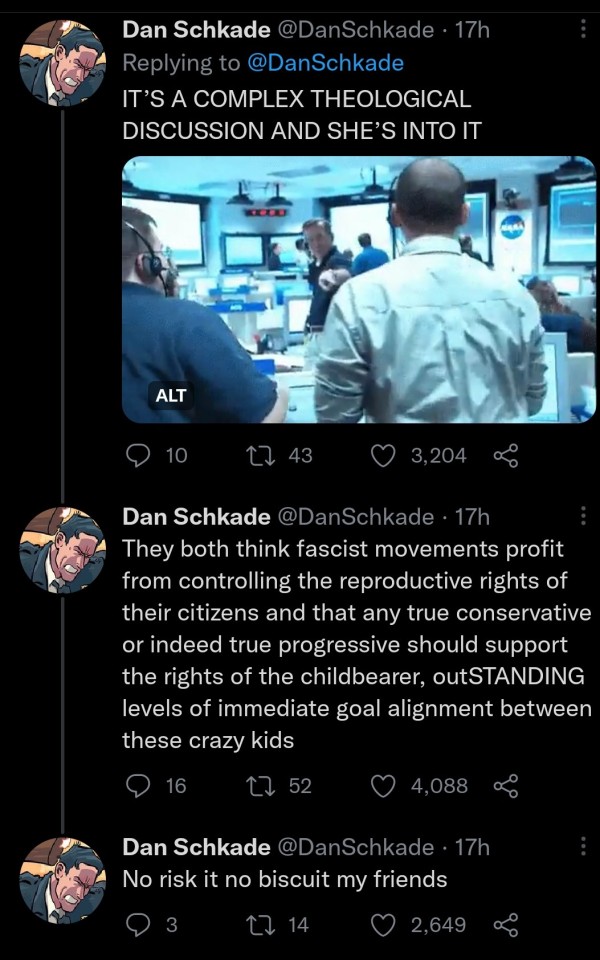
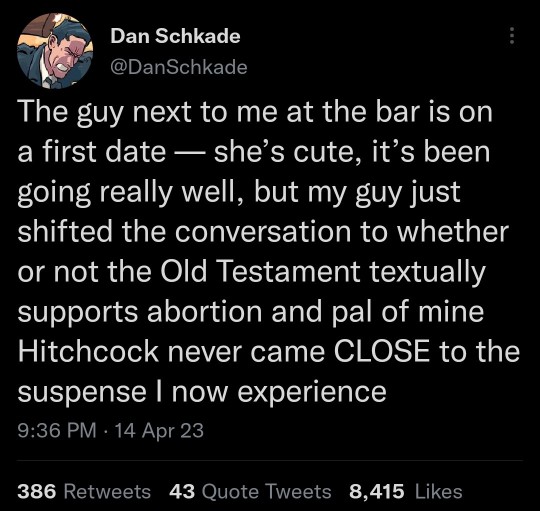
16K notes
·
View notes
Text
Struggling With Our Faith
I believe these are my top struggles with evangelical Christianity: The constant debate between Arminianism and Calvinism. The absolute obsession with the nonstop condemnation of LGBTQ individuals. The endless focus on the pro-life/pro-choice subject and the significant control over women’s bodies. The relentless emphasis on hierarchy, patriarchy, and complementarianism, which in simple terms…

View On WordPress
0 notes
Text
The worship pastor of a high-control evangelical megachurch I attended in college was fired this week for "patterns of inappropriate sexual contact with men, including one minor." I worshipped under him every Sunday for 3 years, the 3 most important years for my indoctrination into conservative evangelical Christianity, when I was age 18-20.
Individuals should be held accountable for their actions, but I am also disturbed by the ways in which churches like that one and other high-control evangelical churches I attended in my early adulthood reinforce this behavior through their ideologies. They tell men that they have headship over their families. They elevate men in their early 30s to positions as "elders." They demonize homosexual attraction as "sin" one must "wrestle with" and "defeat." They demonize all sexual attraction outside of heterosexual marriage as "sin," and tell women to be "joyfully available" to their husbands sexually at all times. They give these men access to minors who view them as spiritual guides.
When I was twenty years old, I heard the head teaching pastor at this church tell a room of thousands of people that he thought God's desire was for a marriage to NEVER end, even if a woman was suffering physical abuse from her husband.
We make these men gods by believing this shit, putting it under fancy theological labels like "complementarian marriage" and "male headship." We buy their propaganda that our silence is obedience, all the creator of the universe wants from us lowly women and children.
I am so tired, and I am so heartbroken for the victims of these power-hungry men.
0 notes
Text
Standing Between Complementarians and Egalitarians
The Western church is currently going through a major shift that needs to be acknowledged. Pastors, church leaders, denominations, fellowships, and networks are all deeply engaged in conversations about the role of women in church leadership.
Why are we talking about this? The Western church is currently going through a major shift that needs to be acknowledged. Pastors, church leaders, denominations, fellowships, and networks are all deeply engaged in conversations about the role of women in church leadership, striving to establish a standard on when and how women can teach, preach and lead in the local church. If you’re still in…
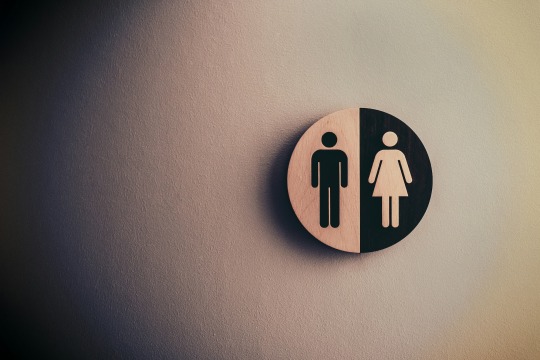
View On WordPress
0 notes
Text
Great, you're deconstructing misogyny, but have you deconstructed complementarianism? Have you unlearned beliefs like "men inherently have [xyz] traits and women inherently have [xyz] traits so they should follow [xyz] roles?" Have you unpacked purity culture which disproportionately impacts the people the church decides are women? Are women viewed as equal partners in relationships, or do women have to submit to their spouse because "men are called to lead"? Do you still believe it's a woman's job to "keep men from straying" and not a man's job to have responsibility for his actions?
Because if you only unlearned "women are lesser than men" and haven't done the work to deconstruct the underlying doctrine, your words are going to say one thing but your beliefs will showcase another thing. And of course this goes for all bigotry, not just misogyny.
Are you actually deconstructing bigotry? Or are you deconstructing the most overt forms of it and just reframing your beliefs so they sound less overtly bigoted? Because "women are lesser than men" and "men and women are just innately different and innately have different strengths so men have to lead and women have to submit" are the same bullshit in different hats.
Obviously it's important to do the work to unlearn the bigotry you more often than not grew up with in Christianity, but I truly think that if you don't also deconstruct the underlying beliefs and doctrine that run alongside (and often encourag) that bigotry in the first place, you're just going to keep running into the same issues over and over again.
132 notes
·
View notes